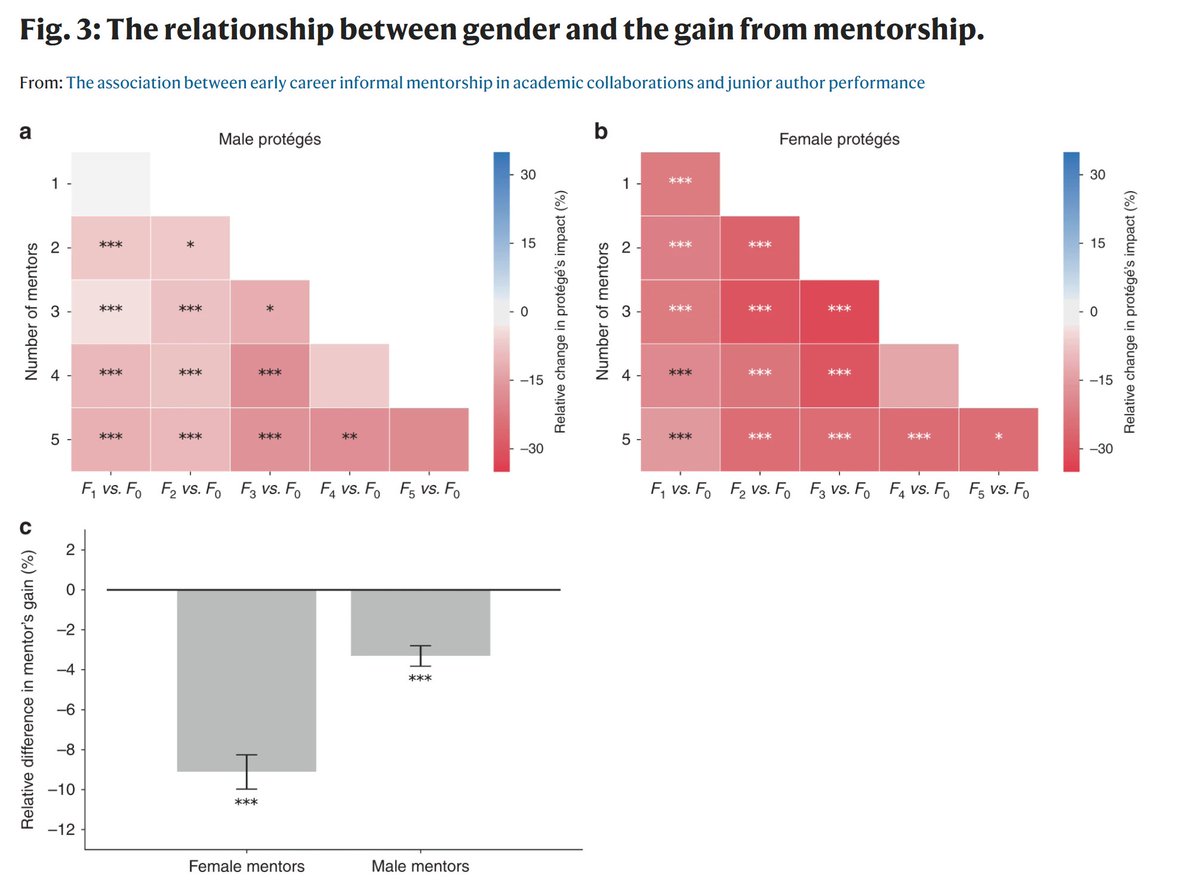I have some thoughts on this @nature article, which suggests that junior researchers fare worse if they had female mentors.
Quick thread (1/n) https://www.nature.com/articles/s41467-020-19723-8#MOESM1
Quick thread (1/n) https://www.nature.com/articles/s41467-020-19723-8#MOESM1
First, some pros:
1) Large dataset on pubs, can identify collabs b/w senior and junior researchers
2) Validates co-authorship is strong predictor of a mentoring relationship
3) Separates fx of mentors with large networks (hub effect) vs many citations (big-shot effect)
(2/n)
1) Large dataset on pubs, can identify collabs b/w senior and junior researchers
2) Validates co-authorship is strong predictor of a mentoring relationship
3) Separates fx of mentors with large networks (hub effect) vs many citations (big-shot effect)
(2/n)
Outcome is the # of citations the junior mentee gets within first 7 yrs of their career
They find big-shot effects are more pronounced than hub effects, but there is support for the existence of both
(3/n)
They find big-shot effects are more pronounced than hub effects, but there is support for the existence of both
(3/n)
Then then do an abrupt pivot to look at gender, without discussing theories for why this should matter 
Mentees with female mentors tended to fare worse, and this was especially pronounced for female mentees
Note these are raw numbers
(4/n)

Mentees with female mentors tended to fare worse, and this was especially pronounced for female mentees
Note these are raw numbers
(4/n)
They conclude that emphasis on same-gender mentor-mentee relationships may not be optimal.
Here's where I have some strong thoughts, after banging my head on the desk a few times.
(5/n)
Here's where I have some strong thoughts, after banging my head on the desk a few times.
(5/n)
First, the authors don't address structural sexism in academia AT ALL.
Men hold most editorial positions at top journals
Men are more likely to be hold leadership positions in academia
Men are more likely to associate with & cite other men
(6/n)
Men hold most editorial positions at top journals
Men are more likely to be hold leadership positions in academia
Men are more likely to associate with & cite other men
(6/n)
These structural factors impact both female mentees and mentors, & have *nothing at all* to do with "mentorship quality."
Suggesting we need more male mentors, as opposed to addressing these structural issues is... yeah.
(7/n)
Suggesting we need more male mentors, as opposed to addressing these structural issues is... yeah.
(7/n)
The authors rightly point out that female mentors are associated with greater female retention!
This could also lead to survivorship bias
E.g. let's junior researchers who have the most initial success (grants, pubs, cites) are more likely to stay in academia
(8/n)
This could also lead to survivorship bias
E.g. let's junior researchers who have the most initial success (grants, pubs, cites) are more likely to stay in academia
(8/n)
If female mentors do better at retaining more folks, that might bring down the average (and that's not a bad thing)!
I guess this what happens when you have a bunch of computer scientists try to characterize human behavior.
End rant (9/9)
I guess this what happens when you have a bunch of computer scientists try to characterize human behavior.
End rant (9/9)
Okay an additional gripe: their data go back 100 years, maybe mentoring relationships and gender influences have changed a bit during that span?
Curious how things would look if you subset to last 10 or 20 years
Curious how things would look if you subset to last 10 or 20 years

 Read on Twitter
Read on Twitter






